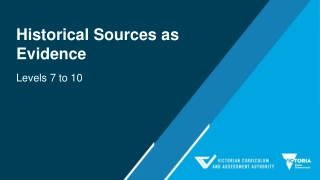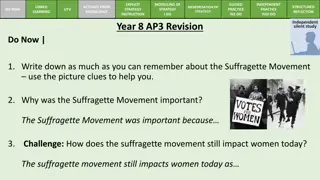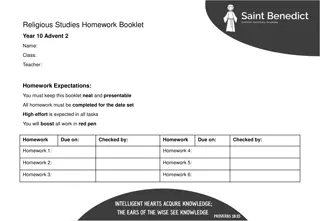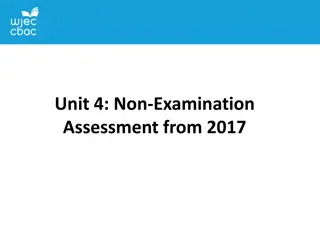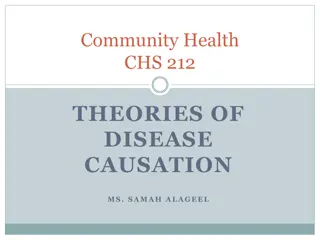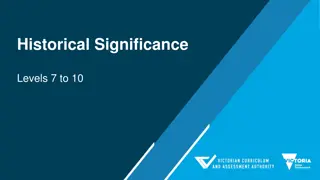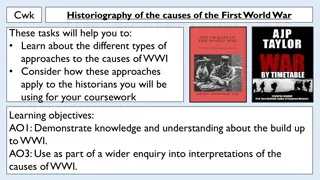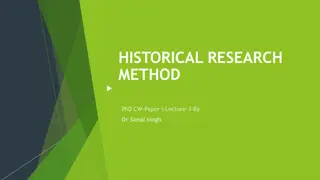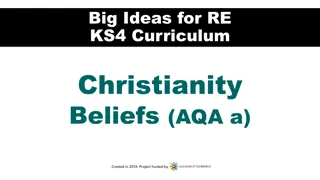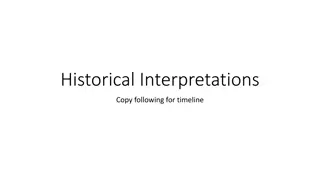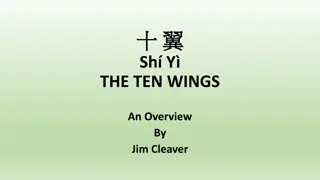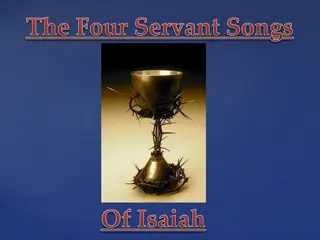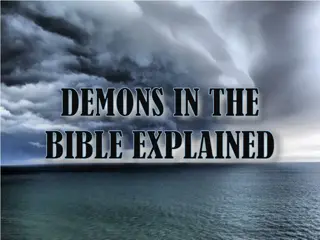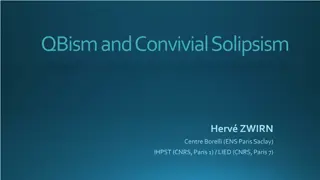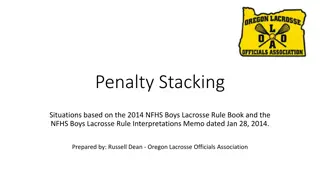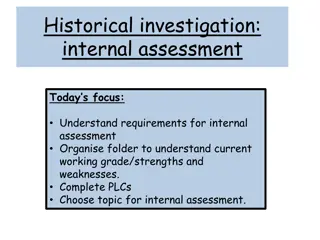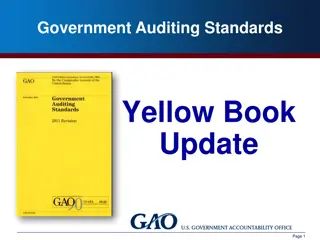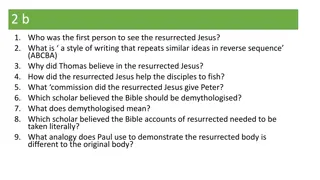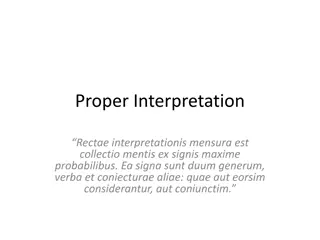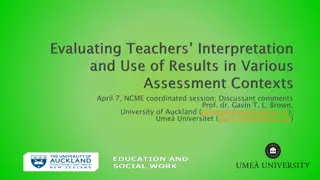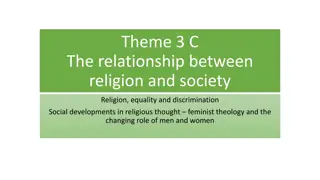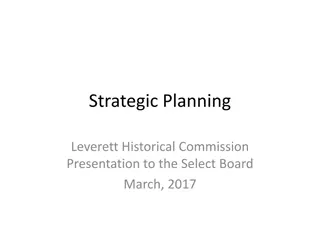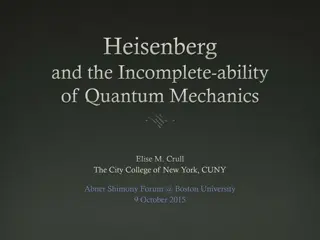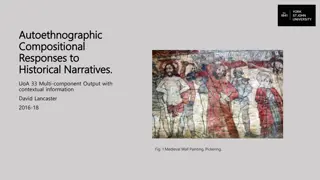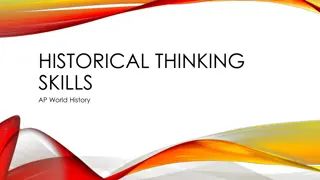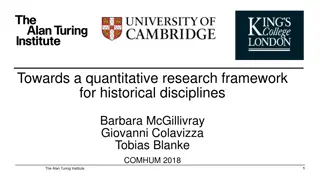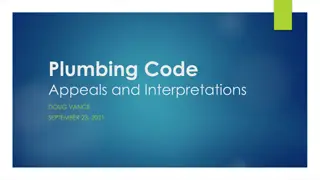Historical Sources as Evidence
Explore the importance of historical sources as evidence in the Victorian Curriculum History context, focusing on how students analyze, evaluate, and utilize sources to create historical explanations and arguments. Discover the significance of primary and secondary sources, perspectives of historica
1 views • 46 slides
Theories Explaining Deviant Sexual Behavior Throughout History
Explore historical theories on deviant sexual behavior, including demonological, anomie, psychoanalytical, human ecology, and somatotyping theories. These theories range from supernatural beliefs of possession to scientific interpretations of societal influences and individual characteristics.
2 views • 33 slides
Art Historical Analysis Class for High School
Delve into the world of art historical analysis through a high school class presentation covering topics such as identification, history, content, and analysis. Discover the visual experience of art and its significance in various artworks, including formal analysis, style variety, and iconology. Un
3 views • 36 slides
Propriedade
Property is the most extensive real right, granting the holder the ability to use, enjoy, control, and even claim back the possessed item. Explore the historical origins of property rights, from Roman law to modern interpretations. Delve into the elements constituting property rights and theories su
5 views • 18 slides
Challenges and Solutions in Implementing Historical Competencies in Teaching
Explore the complexities and obstacles faced in implementing historical competencies in teaching, as discussed by Jens Aage Poulsen, a senior lecturer and researcher at HistoryLab, University College Lillebaelt, Denmark. The content delves into competence-based curriculum, core historical competenci
0 views • 7 slides
Exploring Historical Events and Movements in Educational Context
Dive into the Suffragette Movement, chronological events in English history, differences between interpretations and sources, and a glimpse into World War I. Engage in guided practice and reflection to enhance learning skills.
0 views • 12 slides
Exploring Scripture Interpretations: Noah's Ark and Incarnation in Year 10 Religious Studies Homework
In this Year 10 Religious Studies homework booklet, students delve into the concept of Incarnation and interpretations of Scripture, focusing on John 1 and Noah's Ark. They analyze the nature of Jesus as both fully God and fully Man, as well as how different interpretations of Biblical stories like
1 views • 8 slides
Unit 4: Non-Examination Assessment Overview
The Unit 4 Non-Examination Assessment from 2017 focuses on working as a historian, with tasks including source evaluation and discussion of different historical interpretations. The assessment is marked out of 40 and is worth 20% of the qualification. It assesses knowledge, understanding, source ana
1 views • 14 slides
Theories of Disease Causation and Historical Perspectives
Explore the evolution of disease causation theories from miasma theory to germ theory, epidemiological models, and the socio-environmental approach. Understand the definition of disease, its causes, and how ancient beliefs in spiritual or mechanical forces led to new scientific interpretations.
0 views • 30 slides
Understanding Historical Significance in Victorian Curriculum History
Exploring historical significance levels 7 to 10 in the Victorian Curriculum History, this content delves into the importance of evaluating the past, identifying patterns of change, and assessing the influence of individuals and groups. Students learn to analyze causes, effects, motives, and interpr
0 views • 48 slides
Approaches to the Causes of World War I: Historiography Overview
Explore various historical perspectives on the origins of World War I, from the blame placed on Germany in the Treaty of Versailles to the revisionist and anti-revisionist interpretations that emerged post-World War II. Delve into differing views on nationalism, imperialism, militarism, and alliance
0 views • 13 slides
Interpretation of Apocalyptic Prophecy in the Book of Daniel
Explore the various historical interpretations and approaches to the apocalyptic prophecies in the Book of Daniel, including Preterist, Futurist, and Historicist perspectives. Delve into the significance of key timeframes and events such as the Liberation of Rome from the Ostrogoths, the actions of
0 views • 30 slides
Understanding Historical Research Methods
Historical research is a systematic approach to investigating past events, developments, and experiences. It involves critical examination of evidence, interpretation of sources, and tracing of historical trends to gain insights into social changes. Various definitions by scholars like Kerlinger, Wh
1 views • 21 slides
Exploring Christianity: Beliefs and Key Concepts at KS4
This project delves into the foundational beliefs of Christianity, focusing on key concepts such as the nature of God, the Trinity, Jesus Christ, salvation, the afterlife, and the problem of evil. The curriculum covers diverse interpretations within Christianity, ethical dimensions, philosophical in
0 views • 4 slides
Understanding Historical Research: Methods, Purposes, and Aims
Historical research involves investigating past events systematically to provide a dynamic explanation, interpretation, and understanding of the past. It aims to uncover unknown aspects, answer unexplored questions, and link past happenings to the present to enrich human culture and encourage interd
0 views • 20 slides
Cold War Historical Interpretations Timeline
Explore different historical interpretations of the Cold War through three main perspectives: Traditional/Orthodox, Revisionist, and Post-Revisionist/Contemporary/Post-1991. The Traditional/Orthodox view blames Stalin for the breakdown of relations, the Revisionist view points to mutual provocations
1 views • 9 slides
Understanding the Identity of Jesus Through History and Scripture
Discover the historical context and scriptural interpretations surrounding the identity of Jesus, including insights from the ecumenical council of Nicaea in 325 AD and biblical passages from the Gospel of Luke. Explore the significance of Jesus as Lord, Christ, and Savior, as well as the perspectiv
0 views • 29 slides
Overview of the Ten Wings in "The Ten Wings: An Overview" by Jim Cleaver
The Ten Wings, as discussed in "The Ten Wings: An Overview" by Jim Cleaver, delve into various aspects of the I Ching philosophy. The book breaks down the significance of each wing, such as the Great Treatise and Image Commentary, offering insights into divination and interpretations of the hexagram
2 views • 34 slides
Understanding the Servant Songs of Isaiah and Jewish Interpretation
The Servant Songs of Isaiah, particularly in chapters 42, 49, 50, and 52-53, are pivotal in understanding the prophetic messages related to the servant figure. Isaiah's divisions, historical context, and interpretations within Judaism, including views on the servant as Israel rather than the Messiah
0 views • 38 slides
Themes in Christina Rossetti's Poetry: Critiques and Interpretations
Critics analyze Christina Rossetti's poems through various lenses, exploring themes of morality, temptation, sexuality, and feminist perspectives. They delve into the complexities of her work, uncovering layers of meaning and subtext that challenge traditional interpretations.
3 views • 19 slides
Demons in the Bible Explained: Old Testament References, God's Supremacy, and Possession Phenomenon
Delve into the Old Testament verses that mention demons, explore the concept of God being the only true deity, and discover insights on possession phenomena described in the Bible and other literature. Unravel the intricate connections between demons, sacrifices, and ancient beliefs regarding spirit
0 views • 16 slides
QBism and Convivial Solipsism in Quantum Interpretations
QBism and Convivial Solipsism present different interpretations of quantum mechanics, focusing on the subjective nature of probabilities and experiences within the quantum formalism. QBism emphasizes the subjective interpretation of probability, considering the quantum state as a tool for assigning
0 views • 30 slides
Understanding Penalty Stacking in Boys Lacrosse: NFHS Rules & Interpretations
Explore penalty stacking scenarios in boys lacrosse based on the 2014 NFHS rules and interpretations, covering situations like penalties served simultaneously, goal scored prior to penalty expiration, and penalties stacking when the time expires. Learn about the maximum of three players per team in
0 views • 11 slides
Explore the Intriguing World of Gorgons: Mythology to Modern Interpretations
Delve into the captivating realm of Gorgons, mythical creatures from Greek lore like Medusa, Stheno, and Euryale - whose gaze turned onlookers to stone. Discover the ancient Greek meaning of Gorgons, their depictions, and their modern interpretations in popular culture, including appearances in lite
0 views • 6 slides
Historical Interpretations of the Battle of the Somme
Explore various historical interpretations of the Battle of the Somme and analyze why different perspectives have been constructed. Delve into the complexities of understanding events from the past through literary works and firsthand accounts.
0 views • 16 slides
Requirements for Historical Investigation Internal Assessment
Understand the 25% weightage internal assessment comprising 3 sections for a historical investigation. Focus on source evaluation, investigation, and reflection within a 2,200-word limit. Choose a historical topic, analyze primary and secondary sources, and consider causation, consequence, continuit
0 views • 18 slides
Understanding Historical Context in Skills Development Discourses
Exploring the evolution of apprenticeship and skills development through historical sociology, historical futures, modes of justification, and complexity concepts. Emphasizing the importance of nuanced historical understanding to navigate contemporary challenges in South Africa's skills development
0 views • 29 slides
Update on New Interpretations and Challenges in Government Auditing Standards
This update covers the new interpretations related to the Yellow Book in government auditing standards. It includes details on conceptual framework implementation challenges, peer reviews, and performance/attest independence. The GAO is developing interpretive guidance on assessing and reporting pee
0 views • 42 slides
Understanding the Bible: Key Themes and Interpretations
Explore the significance of the Bible in Christianity, including the Resurrection of Jesus, different writing styles, scholars' interpretations, and the Bible's authority in daily life. Delve into topics like the first sighting of the resurrected Jesus, the styles of writing used, and the varying pe
0 views • 16 slides
Challenges of Uniform Interpretation in the CISG
The CISG, widely accepted among trading nations, faces challenges in uniform interpretation across member states. With over two-thirds of international trade represented by parties to the convention, the issue of varied interpretations arises, despite provisions for uniformity in Article 7. The pote
0 views • 65 slides
Enhancing Validity and Clarity in Assessment Reports through Reader Interpretation
Discussant comments by Prof. Gavin T. L. Brown focus on the importance of ensuring that assessment reports lead to correct interpretations by intended users. The validity of reports hinges on readers' ability to make appropriate inferences and actions based on the test taker's performance. By addres
0 views • 10 slides
The Impact of Feminist Theology on Religion and Society
Examining the relationship between religion and society, feminist theology challenges traditional views on the roles of men and women within Christianity. Scholars like Mary Daly and Rosemary Radford Ruether have made significant contributions to this field, advocating for the liberation of women fr
0 views • 12 slides
Leverett Historical Commission Strategic Planning Presentation Overview
Leverett Historical Commission identifies issues with ad hoc requests, lack of clarity on historical property significance, and inadequate maintenance plans. A strategic plan is needed to define assets, determine significance, create guidelines, prioritize restoration efforts, and establish funding
0 views • 9 slides
Heisenberg and the Incomplete Ability of Quantum Mechanics
A nuanced exploration of Heisenberg's role in the history of Modal Interpretations, revealing how he anticipates MIs. Discussions include contemporary views, Dieks' explanations on modal interpretations, and Heisenberg's stance on quantum propensities. The presentation emphasizes the transition from
0 views • 14 slides
Exploring Historical Narratives through Music and Art
This submission presents two original compositions that delve into historical narratives through a unique blend of music and visual art. The compositions aim to reinterpret stories from the past, creating innovative structures and forms. By intertwining various perspectives and utilizing cinematic t
0 views • 8 slides
Historical Source Analysis Exam Questions Overview
The provided content outlines exam questions related to historical sources, guiding students on analyzing, evaluating, and interpreting information from different sources. The questions cover a range of topics such as learning from sources, assessing accuracy, understanding significance, and making
0 views • 12 slides
Developing Historical Thinking Skills in AP World History
AP History classes aim to cultivate apprentice historians by fostering historical thinking skills (HTS). These skills include Chronological Reasoning, Comparison and Contextualization, Crafting Historical Arguments, and Historical Interpretation. Each skill set equips students with the ability to an
0 views • 15 slides
Quantitative Research Framework for Historical Disciplines
Scholarly communities in historical disciplines are combining quantitative and qualitative methods to study phenomena that change over time. The proposed general methodological reflection aims to enhance research in historical linguistics through quantitatively driven models and claims. Quantitative
0 views • 18 slides
8th Grade STAAR Review Questions on American History
The content provides a set of STAAR review questions for 8th-grade students covering American history from 1607 to 1877. Questions include events in chronological order, historical periods, and interpretations of key historical concepts like Manifest Destiny and the United States Constitution. Stude
0 views • 90 slides
Plumbing Code Appeals and Interpretations Overview
This document provides information on the agenda, upcoming professional development events, Building Code Appeal Board, Appeal Board decisions, Code Interpretation Committee, code interpretations, and final thoughts related to plumbing code appeals and interpretations. It covers the appeal process,
0 views • 8 slides
